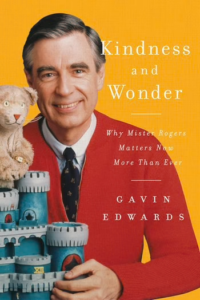 Summary: Half biography, half inspirational insights into how to learn from Mister Rogers.
Summary: Half biography, half inspirational insights into how to learn from Mister Rogers.
I am not unfamiliar with Mister Rogers’ story. In addition to regularly watching old episodes of his TV show with my four and six-year-olds, I have read four books by or about him over the past couple of years and watched several documentaries. But despite the familiarity, I continue to pick up books about him because, as the subtitle suggests, Mister Rogers continues to matter.
The full biography, The Good Neighbor, released last year, gave the most complete picture of Mister Rogers’ full life, but it was not perfect. There is room for more biographies. Kindness and Wonder did not attempt to duplicate the work of The Good Neighbor. Still, even in the short length of the biographical section, Kindness and Wonder included details I had not heard before, and I went a bit deeper into some aspects of his life than The Good Neighbor did.
Kindness and Wonder engaged Fred Rogers’ Christianity well. Mister Rogers would not have been the same Mister Rogers without his faith, and that comes through clearly in the second section. The second section has ten lessons we should learn about Mister Rogers. This is the type of cultural engagement that I would like Christians to do better. It is not merely “do better” advice or self-help but attempting to prod the readers toward selfless maturity. Some lessons impacted me more than others.
Here is a quote:
Consider this passage by Fred Rogers: “How our words are understood doesn’t depend just on how we express our ideas. It also depends on how someone receives what we’re saying. I think the most important part about communicating is the listening we do beforehand. When we can truly respect what someone brings to what we’re offering, it makes the communication all the more meaningful.”
And then just a page or so later
In the 1970s, Hallmark invited Mister Rogers to design a Christmas display for its flagship Manhattan store. Other celebrities also contributed elaborate Christmas set pieces, what one observer called “phantasmagorical decorations.” Mister Rogers’ offering didn’t sparkle or spin or blink. It was a small Norfolk Island pine tree, planted in a transparent box so that its roots would be visible, and completely devoid of any decorations or ornaments. The display had a plaque with a message that was simple but deep: “I like you just the way you are.”
There has been real pushback against Mister Rogers’ radical acceptance of people. More than several people have blamed the rise of narcism on Mister Rogers. But you cannot separate the first quote from the second. Mister Rogers adopted particular people to love well. He accepted them as they were. But he also assumed that others, when loved well, would love others around them well too.
The story related here and other places from Franc Clemmons (Officer Clemmons), I think, is an example of that radical love.
On one of his visits back to Pittsburgh, circa 1970, Clemmons was standing in the WQED studios, watching Mister Rogers film the end of an episode, saying, “I like you just the way you are, and you make every day a special day just by being you.” Clemmons said, “I was standing on the other side of the studio, but I swear he was looking into my soul. And I stood there and I looked and I looked and he kept looking at me.” When Mister Rogers had finished his take and stepped away from the camera, Clemmons walked up to him and asked, “Fred, were you talking to me?” The answer: “Franc, I’ve been talking to you for two years. You finally heard me today.”
Kindness and Wonder is not hagiography. There are weaknesses shown. But this is the story of a man who was good in many ways. And the point of the subtitle is made; we do need truly good people more than ever.
Kindness and Wonder: Why Mister Rogers Matters Now More Than Ever by Gavin Edwards Purchase Links: Hardcover, Kindle Edition, Audible.com Audiobook